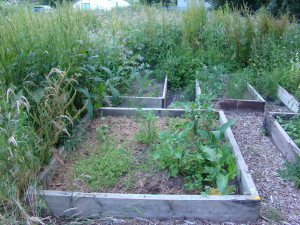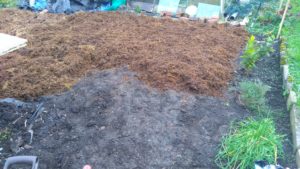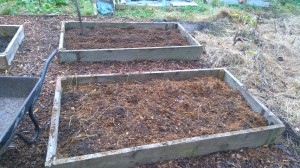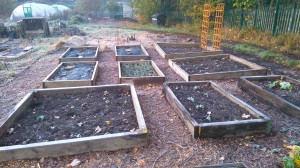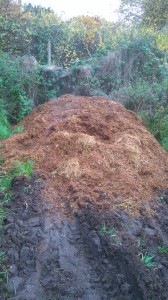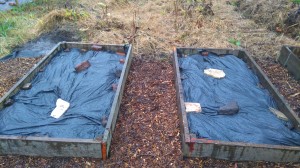You’ve just half killed yourself digging your allotment in the autumn. You’ve spent several days hobbling around, suffering from the exertion and congratulating yourself on all your hard work.
But then it rains and you can’t get down to your allotment for a few days.
Your jaw drops, your heart sinks and you wonder if it is worth it. Your nicely dug bed is covered with weeds. Quite how they grow that fast is a mystery to us all and if only your vegetables would grow as fast.
It is soul destroying but why does it happen and how do we stop those weeds from taking over?
Why Digging Makes Weeds Grow
Why is it that when you dig over your plot the weeds sprout up and go crazy?
There’s a very simple reason behind this.
Seeds from the weeds sit dormant in the soil. They are buried underground and wait until the conditions are right before they germinate. One of the main things they need for this to happen is light.
You come along, turn the soil and expose all these tiny seeds to the light. They instantly start to germinate and before you know it, your plot is covered in weeds.
Unfortunately, there isn’t much you can do about this as seeds are going to gather in your soil. You can minimise this by preventing weeds from germinating. If you haven’t got time to weed properly, wait until flowers have finished blooming (so the bees benefit) and then remove the flower heads before they go to seed.
There is a saying amongst gardeners that says that if you keep your plot free for seven years, then the majority of the weeds will be gone and won’t return. However, be aware that seeds can still be blown in on the wind and brought to your plot by birds. This does require that your neighbouring plots are also weed free.
Stopping the Weeds from Taking Over
This is the most important thing because there is nothing worse than digging your plot, then returning a week or more later to find it looks like you have never touched it.
To prevent the weeds from returning you need to cover the ground. This keeps out the light and prevents the seeds from germinating. Plants such as mares tale, comfrey, bindweed and blackberries will continue to grow under the covers, but these are much easier to deal with when the ground is bare and covered.
Firstly, do not use carpet to cover your plot. It is often recommended and after having done it myself I can, hand on heart, say it is the worst idea ever. A lot of allotment sites ban carpet because it contains chemicals that leach into the soil.
However, that’s the least of your problems. Carpet becomes wet, heavy and rots horribly. Seeds will germinate on top of the carpet and grow through it, making it a nightmare to move. Then, at the end of the growing season, you have to dispose of it when you uncover your plot. It is bulky, will be filthy dirty and you will have to put it in your car to move it. It will be riddled with bugs and make a mess of your car. I used carpet once many years ago and have never used it since. Once I removed it I had to get the car valeted as it made such a mess.
There are much better things you can use, which have less of an environmental impact and are easier for you to manage.
One of my favourites is to use horse manure. I will cover beds with anything from two to six inches of manure. Ideally, you need to use well-rotted manure, but if you are covering your beds in the autumn, then you can use less well-rotted manure as it has several months to break down. I will also cover the beds with tarps or weed membrane which helps keep the heat in and speed up the composting process. You can further speed it up by removing the covers every three or four weeks and giving the manure a quick fork over to stop it getting compacted. This will restart the composting process if it has stopped.
As well as, or instead of, manure, you can use tarps or weed membrane on your plot. Many of allotment owners I know cover the beds they aren’t using in the autumn and then uncover them come springtime.
This has a lot of advantages. It keeps the weeds down, which obviously is very important, but it also helps to heat the soil. When spring finally arrives, the beds are typically warmer than they would have otherwise been, meaning you can plant earlier. Combine this with raised beds and you can often plant two or three weeks before the rest of the soil has warmed up sufficiently.
Cover Your Beds, Keep The Weeds Down
So, as you dig your beds, then cover them afterward. This is going to save you a lot of work and disappointment. Tarps can be found in the pound shops and other discount shops where they are not expensive.
If you are buying weed membrane then you must avoid the ones you find in the cheaper shops. These are a thin, flimsy fabric that will do nothing for your bed. Buy good quality weed membrane such as the Yuzet brand on Amazon (located here. It isn’t cheap, but it is extremely good at keeping weeds down and can be used for several years. With this particular weed membrane, use a flame to seal the edges after cutting to stop it fraying.
Alternatively, the cheapest option is to buy good quality black plastic rubbish bags. Split these and then weigh them down with bricks or pieces of wood. These are great for raised beds as you can staple the bags onto the wood of the beds. Be aware though that the thinner bags may not survive high winds (that’s experience talking for you). Decent quality bags will keep the weeds down and survive the winter.
When you cover your beds, you are suppressing the annual weeds. Some of the persistent perennial weeds will continue to grow, but these are much easier to remove when the soil is bare. Every autumn, when you dig your beds, or anytime you are not using an area of your vegetable garden, cover it. This is going to save you a lot of work in the long term and give you more time to concentrate on the fun aspects of vegetable gardening.
